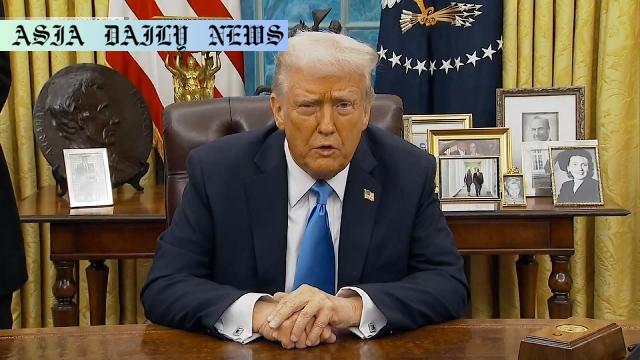Sanctions: US President Donald Trump lifts most sanctions on Syria, signaling support for the interim government’s rebuilding efforts.

Trump’s Executive Order on Sanctions: A Game-Changer for Syria
In an unexpectedly bold decision, US President Donald Trump marked a significant shift in American foreign policy by lifting most sanctions on Syria. This move, formalized through an executive order, demonstrates a clear US endorsement of the new interim government led by Ahmed al-Sharaa. Sharaa, a former leader within Syria’s anti-government forces, rose to prominence following the historic fall of Bashar al-Assad’s regime last December, ending over 50 years of autocratic rule by the Assad family.
The executive order removes sanctions on the majority of Syria’s economic and governmental sectors, providing a much-needed lifeline for rebuilding efforts. One crucial element of the order, however, maintains restrictions on the former Syrian president, Bashar al-Assad, as well as his key associates and individuals linked to chemical weapons usage. This ensures accountability remains intact for actions committed by the ousted regime.
A Strategic Shift in US-Syria Relations
Trump’s decision reflects the increasing pragmatism in US-Syrian relations. Six months of positive developments in Syria have spurred this policy adjustment. By choosing to back Sharaa and his government, the United States is keen to play a vital role in ensuring peace and stability in the region. Rebuilding a nation ravaged by years of civil war is no small feat. However, lifting sanctions unlocks opportunities for Syria to attract international aid, investments, and expertise that can accelerate recovery efforts.
Additionally, the review launched by Secretary of State Marco Rubio regarding Syria’s designation as a state sponsor of terrorism highlights a willingness to reevaluate outdated classifications. Such measures open doors to diplomatic and financial collaborations in the near future. This recalibration signals an end to punitive measures and a fresh start for Syria’s integration into the global community.
The Path Forward for Syria’s Stability and Rebuilding
Syria’s interim government faces a challenging but hopeful future. With the backing of the world’s foremost economic and military power, Ahmed al-Sharaa’s administration stands to gain global recognition and support. However, to effectively capitalize on this window of opportunity, the interim government must focus on establishing transparent governance, fostering social unity, and encouraging economic revitalization.
Challenges remain in terms of rebuilding infrastructure damaged in the prolonged civil war. Further, alleviating deep political, social, and economic divides among various factions within the country requires dedicated leadership. The lifting of sanctions provides Syria with the tools and resources to address these gaps, promote inclusivity, and secure a peaceful future.
In conclusion, President Trump’s executive order is a bold political statement underscoring the United States’ commitment to paving a path for stability in Syria. The move sets a precedent for global powers to rally behind the rebuilding efforts while addressing human rights and governance challenges. As Syria embarks on this critical phase, the world will watch how the nation shapes its post-conflict identity.
Commentary
The Impact of Lifting Sanctions on Syria
President Trump’s executive order lifting most sanctions on Syria marks a pivotal moment in international geopolitics. As someone who follows global political developments keenly, I believe this decision has the potential to redefine Syria’s future while presenting an intriguing case study of realpolitik and humanitarian aid. It is an acknowledgment of Syria’s ongoing transformation and an olive branch to a nation that has suffered greatly from war, instability, and sanctions.
Challenges in Rebuilding Efforts
Rebuilding Syria is a monumental task that goes beyond infrastructure reconstruction. True rebuilding involves fostering trust among diverse ethnic and political groups that have been at odds for years. The interim government, headed by Ahmed al-Sharaa, shoulders immense responsibility. The lifting of sanctions is undoubtedly a lifeline, but without sound governance, peace efforts may falter.
One cannot ignore the complexities of reintegrating Syria into the global economic and political order. For a country that was once deemed a pariah state, the interim government must work tirelessly to demonstrate its legitimacy and commitment to international norms. This is an opportunity for the US and other global players to ensure that the mistakes of the past do not repeat themselves.
Hope Amid Uncertainty
While I applaud the decision to lift sanctions, it’s essential to maintain a certain level of caution. Transition periods in post-conflict countries can be fraught with uncertainties. The support of international powers, including the United States, can be a double-edged sword, offering both opportunities and challenges tied to geopolitical interests.
As the world watches Syria’s transformation, I am hopeful yet realistic. Positive change requires consistent efforts from Syrians and the international community alike. The lifting of sanctions is a step in the right direction, but the road ahead is long, requiring diplomatic skill, social unity, and sustained humanitarian aid.


